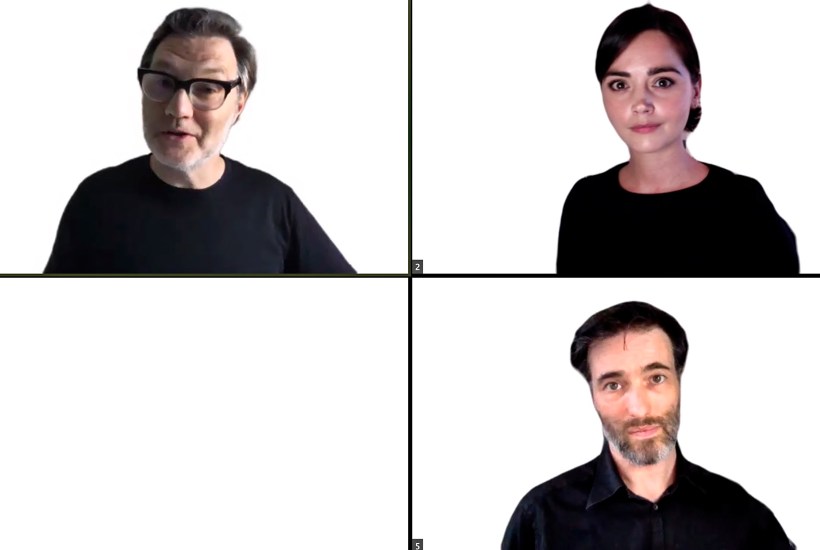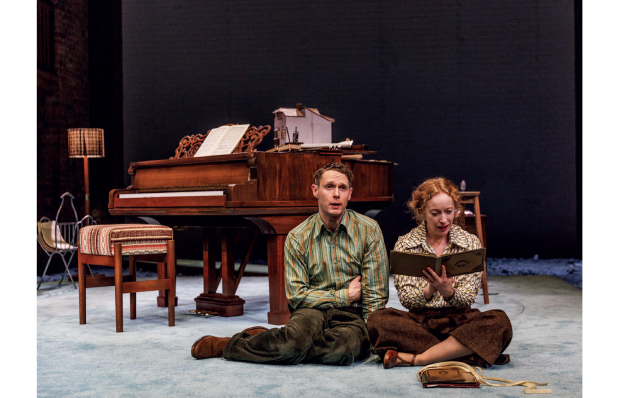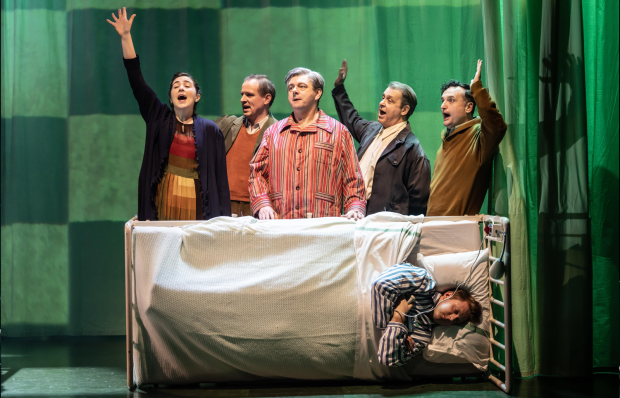A TV play by Tom Stoppard, A Separate Peace, was broadcast live on Zoom last Saturday. I watched as my screen divided itself into four cubes in which appeared the actors, performing from home. The play was written in 1964 and it’s well suited to the split-split screen format because no physical contact occurs between the characters. Director Sam Yates added some rudimentary music and a bit of wobbly background scenery.
Mr Brown (David Morrissey) is a mysterious Englishman who asks to be admitted to a private hospital in the middle of the night. Though he has no symptoms he’s given a bed, and he pays his bills in cash. ‘There’s nothing wrong with you,’ complain the medics. ‘That’s why I’m here,’ he says. ‘I came for the white calm, meals on trays and quiet efficiency.’ He recalls an experience during the war when he spent four years in a PoW camp far removed from the risks and stresses of fighting. ‘It was like winning, being captured.’ Clearly he wants to revisit his experience of indolent withdrawal and it’s this bizarre craving that gives the show its relevance.
Tom Stoppard, back in the 1960s, seems to have foretold the era we’re currently living through and devised a character who embraced the virtues of blissful disengagement. Right now, the whole world is Mr Brown. Once our basic needs are met, all we desire is to desire nothing. As a concept, the play is ingenious. As a drama it lacks bite or development. The nurses gossip about Mr Brown and a doctor mounts a half-hearted investigation into his background. But he doesn’t alter or grow. He ends the play as he began, an amused, well-meaning, witty and entirely inscrutable presence, who makes teasingly paradoxical comments about his lack of health problems.
‘The trouble is, I’ve always been so well. If I’d been sick, I would have been all right.’
The show was presented live but it was a hopeless substitute for the real thing. The pulse, the sweat, the sense of danger, the musk of nerves in the air were missing. Without those ingredients, the theatre is nothing. This was an oddly depressing experience.
The BBC’s Culture in Quarantine features an adaptation of Angela Carter’s 1991 novel Wise Children. This sprawling pastiche covers the lives of two theatrical clans, the Chances and the Hazards, who fight and fornicate their way through the 20th century. The adapter, Emma Rice, has decided not to use a single strand of the tale but to lump the whole thing on stage in one go. The running time of two hours is far too long for a comedy.
The narrators, Nora and Dora, are veterans of the stage who use grating fake-Cockney voices that suggest an absence of felt emotion. Everything is done in the same larky and unvarying tone. And the story is critically overloaded, like a hoarder’s trolley. The endless parade of seductions, betrayals, marriages, births, deaths, rapes and so on gives the characters no room to breathe, reflect or develop. Each chunk of narrative is told in a three-minute sketch, ending in a song-and-dance routine, which then morphs into another three-minute sketch with the same shape. After an hour of skits, disaster strikes. The family’s theatre burns down but even this calamity turns into another burst of glib hysterics as the actors caper around waving crimson puppets to represent flames.
Who is this for? Not a school audience. There’s far too much swearing, dry-humping and punning ribaldry. Shakespeare-lovers may (or may not) be amused to hear a character saying that her favourite play is ‘As You Lick It. And let’s face it who doesn’t like to lick it? But I do draw the line at anything entering my Coriolanus.’
The great Max Miller appears several times, in pastiche, but the script includes one of his least charming gags. He’s walking along a cliff-top parapet when he sees a naked woman approaching. ‘I didn’t know whether to toss myself off or block her passage.’ Hardly family viewing. My guess is that the show is aimed at the company itself. They seem absolutely blown away by their world-class energy and talent.
Emma Rice, directing her own adaptation, appears to have indulged every rehearsal-room suggestion and incorporated it in the production. It’s very hard work. And not pleasant to look at. The Hazards occupy a poky caravan cluttered with gaudy knic-knacks. Nora and Dora, who are supposed to be showgirls, are dressed like dinner ladies in the uniform of 20th-century drudgery. The male dancers wear blue shower caps which deprive them of sexual charisma. And what’s the point of mocking overweight women by dressing a character in a fatsuit that looks like a mudslide?
The popularity of Angela Carter’s lightweight scribbles has always puzzled me. The mystery deepens.
Got something to add? Join the discussion and comment below.
Get 10 issues for just $10
Subscribe to The Spectator Australia today for the next 10 magazine issues, plus full online access, for just $10.
You might disagree with half of it, but you’ll enjoy reading all of it. Try your first month for free, then just $2 a week for the remainder of your first year.














Comments
Don't miss out
Join the conversation with other Spectator Australia readers. Subscribe to leave a comment.
SUBSCRIBEAlready a subscriber? Log in